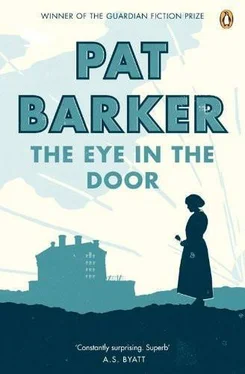Shortly after the outbreak of war, Miss Burton’s little dog had gone missing. Miss Burton was a spinster who haunted the parish church, arranged flowers, sorted jumble, cherished a hopeless love for the vicar — how hopeless probably only Prior knew. He’d been at home at the time, waiting for orders to join his regiment, and he’d helped her search for the dog. They found it tied by a wire to the railway fence, in a buzzing cloud of black flies, disembowelled. It was a dachshund. One of the enemy.
In that climate Beattie had found the courage to be a pacifist. People stopped going to the shop. If it hadn’t been for the allotment, the family would have starved. So many bricks came through the window they gave up having it mended and lived behind boards. Shit — canine and human — regularly plopped through the letter-box on to the carpet. In that isolation, in that semi-darkness, Beattie had sheltered deserters and later, after the passing of the Conscription Act, conscientious objectors who’d been refused exemption. Until one day, carrying a letter from Mac, Spragge had knocked on her door and uncovered a plot to assassinate the Prime Minister. Or so he said.
Could she have plotted to kill Lloyd George? Prior thought he understood how the powerless might begin to fancy themselves omnipotent. The badges of hopeless drudgery, the brush and the cooking-pot, become the flying broomstick and the cauldron, and not only in the minds of the persecutors . At first there would be only wild and flailing words, prophecies that Lloyd George would come to a dreadful end and then, nudged along by Spragge — because whatever Beattie’s part in this, Spragge had not been innocent — the sudden determination to act out the fantasy: to destroy the man she blamed for prolonging the war and causing millions of deaths.
Lode would have had no difficulty in believing Spragge. The poison plot fitted in very neatly with his preconceptions about the anti-war movement. Not much grasp of reality in all this, Prior thought, on either side. He was used to thinking of politics in terms of conflicting interests, but what seemed to have happened here was less a conflict of interests than a disastrous meshing together of fantasies.
He began putting away the files. It was a situation where you had to hang on to the few certainties, and he was certain that Spragge had lied under oath, and since Spragge had been the only witness, this of itself meant the conviction was unsafe.
He locked the filing cabinet and the door of his room, and walked along to the end of the corridor. The lift was stuck on the fifth floor. He decided not to wait and ran downstairs, coming out on to the mezzanine landing where he paused and looked down into the foyer, as he often did, liking to imagine the hotel as it must have been before the war, before this drabness of black and khaki set in.
The shape of a head caught his attention. Charles Manning , waiting for the lift, and with him — good God — Winston Churchill and Edward Marsh. Prior watched. Manning, though obviously junior, seemed perfectly at ease in their company. Certainly he was not merely dancing attendance; there was a good deal of shared laughter, and, as they moved into the lift, Marsh’s hand rested briefly on his shoulder. Well, well, well, Prior thought, continuing on his way downstairs. ‘Connections’ indeed!
Prior lived in a seedy basement flat in Bayswater. He could have afforded better, but he preferred to spend his money on properly tailored uniforms, and these did not come cheap. His bedroom had french windows that opened on to a small high-walled yard, so dark that he had never been tempted to sit out, though his landlady had made an effort. The walls were painted cream to a height of about ten feet, and there were a number of thin, straggly plants dying in a great variety of containers.
The room was small and L-shaped. His bed lay along the upright of the L, facing the window, with a desk and hard chair at the foot. The baseline of the L contained a wardrobe, with an oval mirror set into the door. There was space for nothing else.
The bathroom was next door. He had a tepid bath, and then, wrapped in his dressing-gown, lay on the bed and lit a cigarette. He was too tired to think constructively, and yet his mind whirred on. This was the frame of mind that led to a bad night, and it irritated him, almost to the point of tears, that he could do nothing about it.
He thought of Beattie in her cell. Eighteen months since Lionel Spragge knocked on her door. Eighteen months ago he’d been in France. Eighteen months ago William Roper had been in Wandsworth Detention Centre. An image of William began to form in Prior’s mind, tiny but powerful, like the initial letter of a gospel. William, naked in his cell, watched constantly through the eye in the door, and beside him, on the stone floor, the uniform he’d refused to put on. A small, high, barred window, lit with a bluish glow from the snow outside.
He found himself resenting the power of this image. The claim it made on his sympathy. Deliberately, he entered the cell and then let himself drift out of the window, between the bars, into the falling snow. He was in France now, lying out in the open with his platoon. The trenches had been blown flat, there was no shelter from the icy wind, no hope of getting the wounded back. And no water, because the water in the water-bottles had frozen. Once a hawk flew over, its shadow black against the snow. The only movement, the only life, in a landscape dead as the moon. Hour after hour of silence, and the snow falling. Then, abruptly, Sanderson’s convulsed and screaming face, as they cut the puttees away from his frost-bitten legs.
This was no use. Prior sat up and started reading The Times , but the print blurred and Beattie’s face took its place, the white hair straggling round her neck. He closed his eyes. The bell of the shop in Tite Street rang as he pushed the door open. How old? Four? Five? A smell of cat pee and tarred string from the bundles of firewood in the corner. Beattie’s cat had never been able to resist marking those bundles. Mrs Thorpe plonked their Alfie on the counter while she paid her bill. Alfie swung his short legs in their sturdy boots, puffing away at a fag end, though he was only three. Between drags, he sucked his mother’s breast, puffing and sucking alternately, peering round the white curve at Prior, who was a Big Boy and therefore an object of interest and suspicion. It was late in the afternoon. Mrs Thorpe would be far gone. Jugs of best bitter were her favourite, chased down by sips of something medicinal that she kept in a flask fastened to her thigh with a home-made elastic garter. Whisky for the heart, brandy for the lungs, gin for the bladder. Alfie, guzzling away at his mother’s milk, looked contented, and well he might, since it could hardly have been less than 70 proof.
The past is a palimpsest, Prior thought. Early memories are always obscured by accumulations of later knowledge. He made himself walk to the counter again, this time remembering nothing but the moment, push his sweaty coin across the cool marble, and ask, ‘What can I have for a ha’penny?’
There was a white apron round Beattie’s waist with two pockets, stained black from the coins inside them. These coins smelled very strong when she emptied them on to the table to count them, a dark, dank, heavy smell.
‘What can I have for a ha’penny?’
Beattie’s voice, patient as if she hadn’t said all this a million times before, reeled off the list: aniseed ball, sherbert delight, liquorice stick, a packet of thousand-and-ones, and finally — his favourite because it lasted so long — a gob-stopper.
Towers’s eye lay in the palm of his hand. ‘What am I supposed to do with this gob-stopper?’ Logan’s hand reached out, grasped his shaking wrist, and tipped the eye into the bag .
Читать дальше












